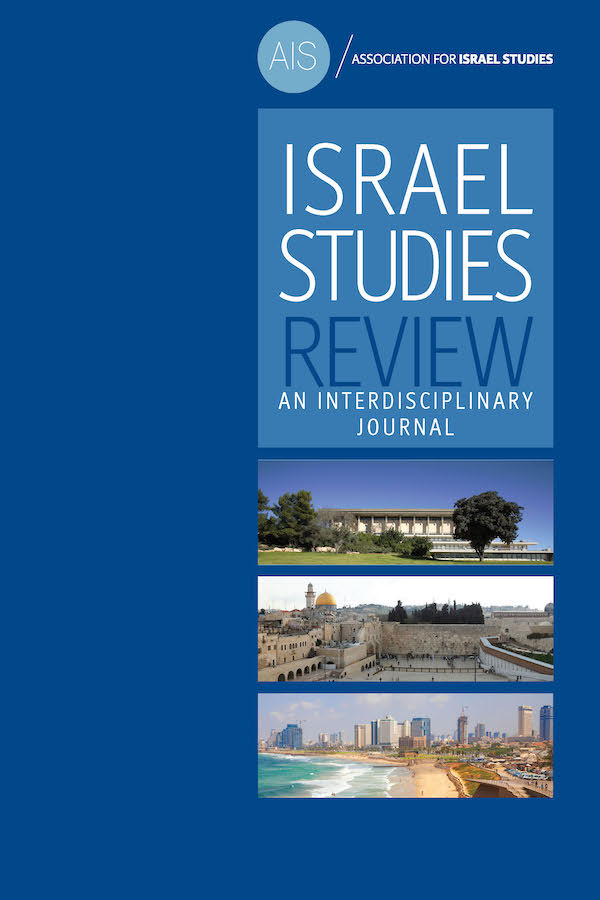
Israel Studies Review
An Interdisciplinary Journal
ISSN: 2159-0370 (print) • ISSN: 2159-0389 (online) • 3 issues per year
Editors:
Oded Haklai, Queen's University (Ontario), Canada
Adia Mendelson-Maoz, The Open University of Israel, Israel
Subjects: Israel studies, Middle Eastern studies, Politics
![]() Available on JSTOR
Available on JSTOR
 Published on behalf of the Association for Israel Studies
Published on behalf of the Association for Israel Studies
AIS Membership includes subscription to this journal.
AIS Members: Access the journal online here.
Latest Issue
Volume 40 Issue 2
Introduction
Perspectives on Gender-Based Violence in Israel
We bring a combined six decades of research on gender-based violence to our roles as co-editors of this special issue. Dalit Yassour-Borochowitz is a feminist social work researcher who has studied for over three decades issues related to intimate violence against women, ethics, and gender in the labor market (Benjamin, Yassour-Borochowitz, and Barzilay 2024; Yassour-Borochowitz 2003, 2012; Yassour-Borochowitz and Wasserman 2018). She currently serves as head of the department of social work at Yezreel College, Israel. Madelaine Adelman is an anthropologist and sociolegal scholar whose research centers on the politics of domestic violence (Adelman 2017). Motivated by the possibilities of social change inherent in people working together toward a shared goal, she integrates community-based advocacy into her research on gender-based violence in families and schools (Adelman, Liou et al. 2024; Adelman, Rosenberg et al. 2016; Adelman and Semprevivo 2024). Together, drawing on our expertise in Israel and beyond, we developed the focus for the special issue: to amplify the voices of established as well as emerging scholars and activists engaged in studying and organizing against various forms of gender-based violence in Israel.
Consensual Gender Politics under Neoliberal Restructuring
Historical and Institutional Analysis of GBV Services and Policy Agencies in Israel (1970–2017)
This study examines the proliferation and expansion of governmental and nongovernmental institutions addressing gender-based violence in Israel under neoliberal policies since the mid-1980s. Using longitudinal data from our original WPA-IL (women's policy agencies) dataset documenting GBV (gender-based violence) institutions from 1970–2017, we analyze the field's characteristics and stakeholder interactions over time. We focus particularly on hybrid patterns of service provision between government bodies and women's NGOs. We argue that neoliberal institutionalization and professionalization prompted the devaluation and underfunding of women's work in this sector while erasing feminist knowledge about GBV. The hybrid model, initially designed to support grassroots initiatives, has enabled for-profit organizations to compete for limited state resources through social service procurement.
Cultural Responsiveness of Female Arab Police Officers to Arab Victims of Violence in Israel
Over the past decade, there has been a surge in domestic violence (DV) against Arab women in Israel, with their representation as victims exceeding their percentage of the population. Despite increased public discourse about DV, the state's efforts to combat the problem have exhibited notable gaps, raising questions about institutional understandings of women's needs and the inadequacy of location-specific policies. Through semi-structured interviews with female Arab police officers (FAPOs) in Israel, this article explores their subjective perspectives, including their perceptions of the roles they play vis-à-vis Arab women experiencing DV and the institutional barriers that exist to cultural responsiveness when serving Arab women.
Responding to Survivors of Intimate Partner Violence in the Israeli Welfare State
Since 1991, Israel has enacted legislation to prevent family violence and established centers providing therapeutic and prevention services (CPDVs). However, there is limited research on how social workers interpret and implement the goals of this legislation. This study investigates social workers’ perceptions and responses to intimate partner violence (IPV) survivors within welfare services. Through in-depth interviews with fifty social workers handling IPV cases, our analysis identified two key findings. First, social workers’ primary response focuses on therapeutic interventions, which frequently overlook survivors’ immediate safety needs and legal rights. Second, often they adopt a gender-symmetrical approach to IPV, questioning the credibility of women's reports. A common thread of suspicion toward IPV survivors connects both findings, highlighting how social workers’ skepticism may unintentionally undermine efforts to prevent IPV.
Empowerment and Vulnerability
The Tensions Inherent in Raising Feminist Awareness of Young Arab-Palestinian Women in Israel
This article focuses on the experiences of young Arab-Palestinian women in Israel who use feminist services. The mixed-method longitudinal study followed participants in a feminist support program from 2019 to 2022 and uses both qualitative and quantitative analysis to examine the development of feminist awareness and its associations with family and personal risks. The results reveal that increased feminist awareness is associated with greater family risk, reflecting the inherent tensions between feminist empowerment and patriarchal social structures. Participants struggled to reconcile their newfound feminist identities with family expectations and societal constraints. The discussion situates these findings within broader sociopolitical and cultural frameworks and describes the adaptive potential of culturally contextualized Western feminist practices in traditional societies.
Red Flags for Intimate Partner Violence during the Matchmaking Period in the Haredi Community
This article examines the red flags in a short-supervised acquaintance (
“Sixty Percent of the Boys . . . They Break Them to Pieces”
Victims of Violence in Ultra-Orthodox Yeshivas
This qualitative phenomenological study examines violence against male pupils at ultra-Orthodox yeshivas (Jewish religious schools) in Israel who deviate from accepted norms of Torah study. We interviewed thirty-five youths who reflected on their experiences in educational, communal, and domestic settings. Our findings reveal that participants who failed to conform to the scholarly standards of their yeshivas were devalued, sanctioned, and socially, emotionally, and physically abused by authoritative figures. The boys’ coping strategies included engaging in risky behaviors, experiencing a decline in faith and religious practice, and changing their lifestyles and social identifications. The study attests to the importance of further examining the relationship between religion, gender policing, and violence against boys.
Voices From the Field
Ilana Kwartin,